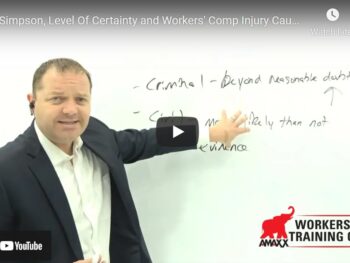
The Prohibited Acts Doctrine is used in workers’ compensation cases as a primary liability defense. While this defense is something every claims management team should explore in workplace injuries, it is often difficult to employ successfully.
A Hypothetical
Consider the case of a truck driver. As part of the hiring process, the employee underwent a three-day orientation and received a copy of the employer’s policy manual. The manual included a number of statements concerning employee conduct, which included a prohibition of the “possession or consumption of alcoholic beverage while on company property, using company equipment, or traveling for work.”
Shortly after employment begins, the employee stopped in central Kentucky for a two-day layover. On the first full day of his layover, the employee wanted to watch the big basketball game and was told by an attendant at the truck stop he was staying that there was a bar about one mile away that had the game on the television. That afternoon he walked to the bar to watch the game and consumed “a few alcoholic drinks.”
Click Link to Access Free PDF Download
“Avoid the 3 Primary Reasons Injured Workers’ Hire Attorneys”
While walking back to the truck stop, a car with bright lights approached the employee, slowed to a crawl, and then accelerated causing him to jump back. The employee fell off the road into a ditch hitting the base of his spine. A workers’ compensation action was initiated related to this incident and primary liability was denied based on the Prohibited Acts Doctrine.
Sounds like a clear-cut case for the defense, right?
Application of the Prohibited Acts Doctrine
As a general rule, an employer/insurer can successfully use the Prohibited Acts Doctrine “where an employer expressly prohibits the doing of a certain specific act, the disregard of which is not reasonably foreseeable to the employer, a violation thereof takes the employee outside the scope of his employment and injuries resulting therefrom are not compensable even though the act might be considered to be in furtherance of the employer’s business.”[1] Whether the employee’s performance of a prohibited act takes the employee outside the sphere of the employment depends, in part, on the nature of the act or conduct, which is prohibited. Not every safety rule limits the scope of employment. The less hazardous the conduct prohibited by the safety rule, the more likely the rule proscribes conduct within the scope of employment. The more routine or minor the prohibited conduct, the more foreseeable it is an employee will violate the rule.[2]
Based upon the general application of the Doctrine, an employer and insurer asserting this defense in the above hypothetical would likely not prevail. Even if consuming alcohol is prohibited, courts will often look to other factors such as the nature of one’s employment, rules considering traveling employees and other factors such as the surface or condition that play a role in the subsequent injury.
Tips to Successfully Asserting a Defense
Cases involving a Prohibited Acts Doctrine are complex, fact dependent and vary in each jurisdiction. Employees are also given some latitude by the courts when the defense is asserted. It is important to remember the following considerations associated with the defense:
- Each case should be analyzed on its own merits and fact. Other factors that make it a difficult defense to assert successfully include obtaining information and testimony from eyewitnesses and specific documentation or prohibitions by an employer. Just because something is prohibited does not mean one will be successful when asserting the defense.
- Practitioners should also note that the prohibited act must also be causally connected to the injury. An injured worker will likely succeed in their claim if the prohibited act plays little to no role in the injury.
- Cases involving a prohibited acts defense may also include other defenses such as possible intoxication or the foreseeable activities of traveling employees.
[1] Bartley v. C-H Riding Stables, Inc., 206 N.W.2d 660, 663, 26 W.C.D. 675, 678-80 (Minn. 1973)
[2] Otto v. Midwest of Cannon Falls, 59 W.C.D. 25, 35 (W.C.C.A. 1999)
Author Michael Stack, Principal of Amaxx Risk Solutions, Inc. He is an expert in employer communication systems and helps employers reduce their workers comp costs by 20% to 50%. He resides in the Boston area and works as a Qualified Loss Management Program provider working with high experience modification factor companies in the Massachusetts State Risk Pool. As the senior editor of Amaxx’s publishing division, Michael is on the cutting edge of innovation and thought leadership in workers compensation cost containment. http://reduceyourworkerscomp.com/about/. Contact: mstack@reduceyourworkerscomp.com.
©2014 Amaxx Risk Solutions, Inc. All rights reserved under International Copyright Law.
SALES TO PAY FOR ACCIDENTS CALCULATOR: http://reduceyourworkerscomp.com/sales-to-pay-for-accidents-calculator/
MODIFIED DUTY CALCULATOR: http://reduceyourworkerscomp.com/transitional-duty-cost-calculators/
WC GROUP: http://www.linkedin.com/groups?homeNewMember=&gid=1922050/
SUBSCRIBE: Workers Comp Resource Center Newsletter
Do not use this information without independent verification. All state laws vary. You should consult with your insurance broker, attorney, or qualified professional.










